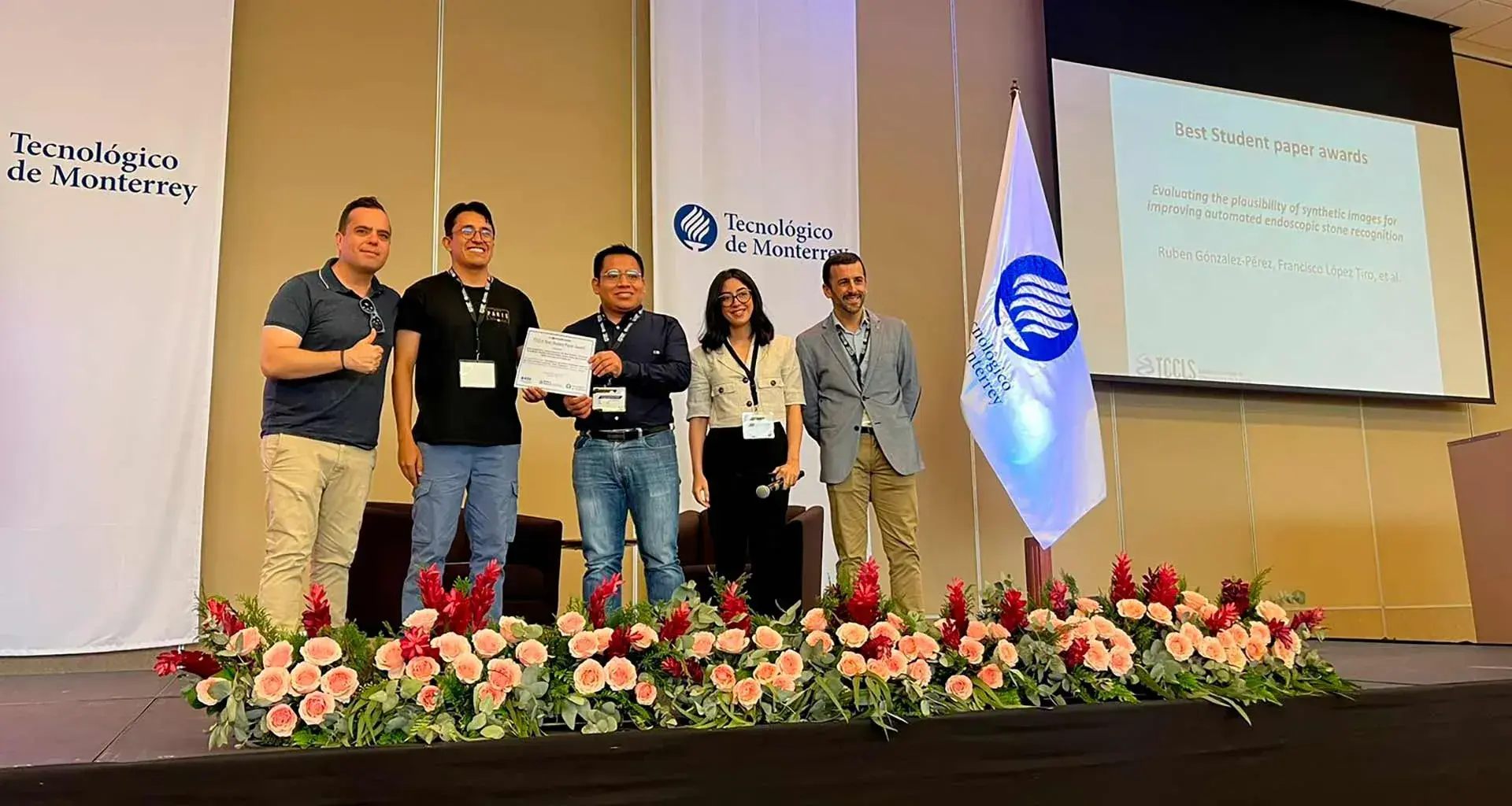Graduate students at the Tec have given presentations on developing artificial intelligence (AI) applications that look to create technological tools and assist in medical problems such as identification of kidney stones, endoscopy correction, and cervical cancer detection.
This was part of the 37th IEEE International Symposium on Computer-Based Medical Systems (2024 IEEE CBMS), which took place at Tec Guadalajara and was attended by academics and graduate students from the Americas, Europe, and Asia.
It was an international symposium on applications of AI in medicine that was endorsed by the Institute of Electrical and Electronics Engineers (IEEE), which was attended by 70 specialists in person and 50 virtually, along with representatives of medical equipment companies.
15 project papers by Tec Guadalajara graduate students were presented individually in which they presented applications to real cases, after having competed among 100 proposals and being endorsed by the inter-institutional organizing committee.
Three of them were recognized at the symposium as Best Student Papers (best projects presented by students), in addition to being published on the IEEEXplore platform.

Advanced AI and computer vision
At Tec de Monterrey, there is a research group called “Advanced AI” that includes the laboratory CV-INSIDE: Computer Vision for Image Analysis & Biomedical Engineering (directed by Professor Gilberto Ochoa Ruiz), which produced the projects presented by Tec students at the symposium.
The following are the three proposals they are working on that were recognized at the symposium, which they presented as scientific papers:
1. Endoscopy images for detecting kidney stones
Rubén González Pérez, a recent graduate of the master’s program in computer science, and Francisco Javier López, a PhD student in computer science, are working on the project: Evaluating the Plausibility of Synthetic Images for Improving Automated Endoscopic Stone Recognition.
They are developing endoscopy imaging for automatic identification and classification of kidney stones. Rubén said that the current techniques take too long and require experts, so it is not easy to perform.
“We’re looking to automate the process using Deep Learning models. The problem is that there’s a lot of data... We don’t have a lot of images to train these models,” he said.
“We’re looking to automate the process using Deep Learning models.” – Rubén González.

2. Classification of endoscopy images
Ricardo Abel Espinoza, M.Sc. student in Computer Science, and Javier Eluney Hernandéz are working on: “Color-aware Exposure Correction for Endoscopic Imaging Using a Lightweight Vision Transformer.”
It is a 3D reconstruction of the colon to generate 3-dimensional images, with which doctors can eventually detect certain diseases such as polyps, bleeding, and malformations.
“It’s an AI-based model, which allows us to decrease the following two problems: underexposure and overexposure of light. It improves the quality of the images so that the physician or another AI-based tool can obtain a better diagnosis,” Ricardo said.
“We decided to use a light transformer to do this light matching on each of the images. Image enhancement methods have to be very fast, almost in real time,” said Tec professor Gilberto Ochoa.
Another challenge, hence the name of the project, is that some AI-based methods for image enhancement eliminate underexposure or overexposure, but lose sight of color. “We were able to generate this method that also preserves color from image to image,” he said.

3. Cervical cancer screening
Orlando Ortiz and Alejandro Gonzalez, M.S. and Ph.D. computer science students, are working on the project “Evaluating DenseNet121 Neural Network Performance for Cervical Pathology Classification” to implement more accurate techniques in the diagnosis of cervical pathology.
Traditional methods rely heavily on human analysis of cervical images and have limitations or variations in interpretation by specialists.
They used images from the International Agency for Research on Cancer (IARC) to train their model and subsequently performed tests on Tec Salud’s Zambrano Hellion Hospital database to evaluate effectiveness in a real clinical setting.
Their partial results indicate promising improvements in diagnostic effectiveness, suggesting more reliability compared to current methods of cervical cancer scanning and diagnosis.

Exchange of ideas and technologies
The 2024 IEEE CBMS enabled the exchange of ideas and technologies between academics and scientists focused on the medical industry.
This program consisted of papers and technical contributions reviewed and selected by an international committee (students from the Guadalajara campus participated in the latter).
Gilberto Ochoa, research professor at the Tec’s School of Engineering Sciences (EIC) and member of the Advanced AI group, explained that this meeting “is a symposium in which scientific papers are presented.”
He also pointed out that this allows researchers and students to meet at an international level every year to discuss health issues, especially in combination with the use of computers. It covers topics such as:
- Radiomics or health care
- Vision systems
- AI for health
- Virtual reality, and others.
“The disciplines which combine health and computers are signal processing, image processing, web interfaces, device design, and the search for new drugs through algorithms,” the researcher added.
“The disciplines which combine health and computing.” – Gilberto Ochoa.
Technological development
The projects selected for the talks were previously sent to an external Mexican committee, which included representatives from the Mexican Artificial Intelligence Society, the CONAHCYT Thematic Network of Applied Computational Intelligence, the Mexican Association of Computing, and the Mexican Association of Sciences for a review and a second evaluation.
The three Tec graduate student projects are still in development and in the maturation stage. Each of them will take between another 18 months and 2 years of work to complete.
The symposium was organized by a team of researchers from Tec de Monterrey together with experts in the field from around the world.
The 38th IEEE International Symposium on Computer-Based Medical Systems (2025 IEEE CBMS) will be held in Madrid, Spain.
ALSO READ:





